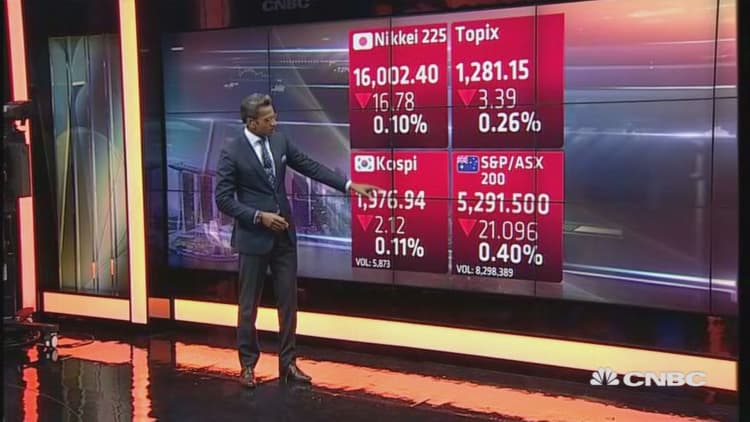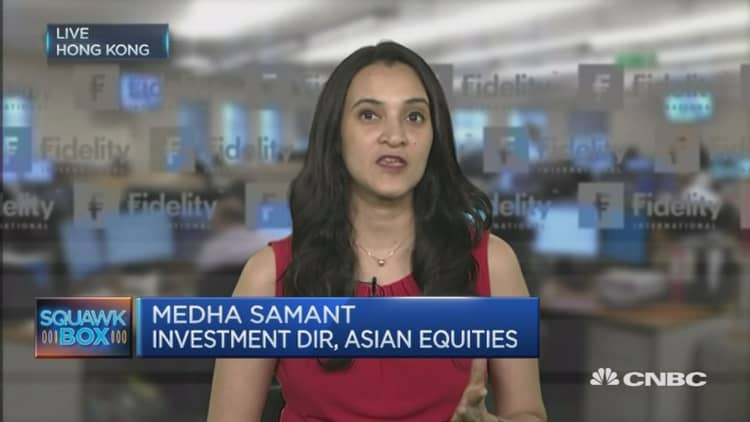


Australia and Japan shares stumbled, but other Asia markets were mixed on Tuesday, as investors remained cautious before central bank meetings in the U.S. and Japan and on uncertainty over whether the U.K. will vote to remain in the European Union.
Australian markets returned to trade after being shut for the Queen's Birthday public holiday on Monday. The benchmark ASX 200 closed down 109.29 points, or 2.06 percent, at 5,203.30, weighed by a 2.19 percent loss in the financials sub-index, which accounts for nearly half of the broader index.
Major Australian banks saw more than 2 percent losses each, with ANZ shares closing down 2.63 percent amid shaky investor sentiment across the region.
In Japan, the closed down 160.18 points, or 1 percent, at 15,859.00, after tumbling 3.51 percent Monday on the back of a relatively stronger yen.
The yen, considered a safe-haven currency, traded at 105.72 against the dollar at 2:47 p.m. HK/SIN, compared with levels around 105.83 on Monday afternoon local time.
Major Japanese export stocks ended mostly lower, with Toyota shares down 0.64 percent, Nissan down 0.5 percent and Honda off by 1.39 percent. A stronger yen is usually a negative for exporters as it reduces their overseas profits when converted into local currency.
Across the Korean Strait, the Kospi fell 7.03 points, or 0.36 percent, to 1,972.03. In Hong Kong, the index was down 0.55 percent as of 3:16 p.m. HK/SIN.
Chinese mainland markets eked out gains before market close, with the composite adding 9.84 points, or 0.35 percent, at 2,842.91, and the Shenzhen composite added 5.27 points, or 0.28 percent, at 1,832.62.
"Undoubtedly, the story of the moment is the consistent moves into fixed income," said Chris Weston, chief market strategist at spreadbettor IG. "Not only is the fixed income market benefiting from low inflation expectations and unconventional central bank policy, but we are now seeing increasing risk aversion flows."
Government bond yields have hit record lows in recent days. Stateside, Treasury yields were lower, with the 10-year yield near 1.61 percent Monday afternoon local time, around its lowest since Feb. 11.
The German 10-year Bund yield remained near zero, while the 10-year Japanese government bond yield also hit a record low of negative 0.163 percent on Tuesday afternoon Asia time.
A negative yield implies investors are paying borrowers for the privilege of parking their cash. Bond prices move inversely to yields.
In the U.K., two new polls showed public opinion over a Brexit remained divided. An ORB poll for the Telegraph showed 48 percent of Britons would vote to remain in the European Union, while 49 percent would vote to leave.
A YouGov poll for the Times of London showed 46 percent preferred to leave, while 39 percent wanted to remain. Popular British newspaper The Sun also endorsed the leave vote for the upcoming referendum vote on June 23.
Gareth Nicholson, an investment manager at Aberdeen Asset Management Asia told CNBC's "Squawk Box" that whichever way the Brexit vote goes, market volatility will increase. "Markets are getting concerned ... volatility is not good for the broader market. That's why you see weakness in foreign exchange and equity."
The British pound traded at $1.4146 in the afternoon Asia time, compared with levels around $1.4600 in late May.
Markets will also be watching the U.S. Federal Open Market Committee (FOMC), which begins its two-day meeting starting on Tuesday.
Kit Juckes, global fixed income strategist at Societe Generale, said in a note Monday the market did not expect the Fed to raise rates.
"The challenge for the Fed is how to continue laying the groundwork for an eventual hike if the data bounce back from the disappointment of May payrolls, against the backdrop of nervous markets," he said.
The Bank of Japan (BOJ) starts its two-day meeting on Wednesday, June 15. HSBC economist Izumi Devalier expects the BOJ to ease policy this week. "The longer the board waits to address downside risks to the economy and prices, the more markets will question the central bank's commitment towards its inflation target," she said in a note.
Devalier added, "Reduced market confidence in the BOJ's inflation commitment could then feed back into a stronger yen (as it did after the April policy meeting), making the central bank's job even more difficult."
Elsewhere, oil prices failed to hold onto the psychologically key $50 level, with U.S. crude down 0.96 percent at $48.41 a barrel as of 2:52 p.m. HK/SIN. Global benchmark Brent was down 0.81 percent at $49.94.
The dollar traded at 94.506 against a basket of currencies as of 2:53 p.m. HK/SIN, up from levels near 93.500 in the previous week.
"Perhaps, there is a degree of market wariness ahead of the FOMC [meeting], which has stymied dollar strength given the possibility of another dovish shift in message or dots," said Wei Liang Chang, a foreign exchange strategist at Mizuho Bank.
Stateside, the closed down 132.86 points, or 0.74 percent, at 17,732.48; the S&P 500 was down 17.01 points, or 0.81 percent, at 2,079.06. The composite finished down 46.11 points, or 0.94 percent, at 4,848.44.


